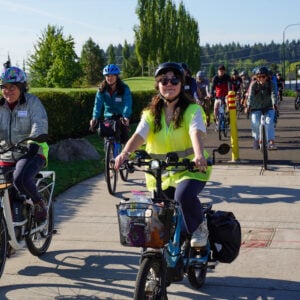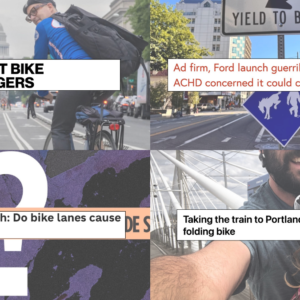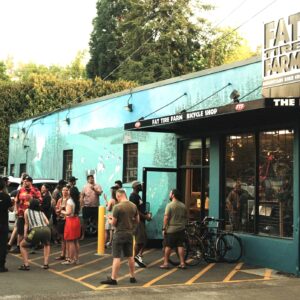
Five years ago today Portland resident Michelle DePass stood up at a meeting for a transportation project on North Williams Avenue and changed the course of local and national cycling politics forever:
“We have an issue of racism and of the history of this neighborhood,” DePass said. “Until we address that history and… the cultural differences we have in terms of respect, we are not going to move very far.”
One month earlier, the Williams project had already been delayed to address tensions between long-time residents of the adjacent neighborhoods on one hand, and city planners and advocates who wanted to redesign the street to make it safer for bicycling on the other. Controversy around the project led to community forums and national media headlines. The Williams Avenue Traffic Safety Project has since became a case-study in the complex and emotional intersection of transportation and gentrification.
A ride on Saturday offers Portlanders an opportunity to continue to learn about how urban planning impacts existing communities.
Gentrification is WEIRD! is a free event hosted by the non-profit Community Cycling Center (with sponsorship from Metro) that will include a bike ride and discussions between community members and participants.
Advertisement
Here’s more from the event description:
The Ride will begin at the Bike Repair Hub in New Columbia and will travel to Vanport, where community members will share stories, history, and, most importantly, HEALING.
Gentrification is the major talking point of the city today — but for many communities here, it has been a reality for far too long.
Activist Laquida Landford partnered with Ignorant/Reflections and Community Cycling Center to create a bike ride to tie the deep history of the lost city of Vanport to the gentrification of today.
Borrowing its namesake from a popular design produced by local clothing line Ignorant/Reflections, Gentrification is WEIRD! – The Ride will include live performances, guest speakers, food, and informational booths from an array of community organizations.
There will be live performances by Poetic Justice crew, poetry by Llondyn Elliott, and DJ Ryder will be spinning.
Event organizers say Portland Mayor-elect Ted Wheeler will be there to field questions from Donovan Smith, co-organizer of the event and owner of Ignorant/Reflections.
North Portland’s pace of change hasn’t slowed down at all since the Williams project controversy was front-page news. In fact, given the number of cranes and construction projects I see on my daily north Portland commute, it has probably sped up. These changes always have impacts on people who live nearby, and their stories are often left untold. Saturday’s ride will be a valuable opportunity to hear those stories and to gain a deeper understanding of gentrification and the systemic racism that’s inherent in much of our urban planning practices and policies.
— Jonathan Maus, (503) 706-8804 – jonathan@bikeportland.org
Our work is supported by subscribers. Please become one today.







Thanks for reading.
BikePortland has served this community with independent community journalism since 2005. We rely on subscriptions from readers like you to survive. Your financial support is vital in keeping this valuable resource alive and well.
Please subscribe today to strengthen and expand our work.
I will have to look into this since it looks interesting. It is unfortunate that no politicians enacted rent control at least 15 or so years ago.
I moved to Portland in August, 2013 and for the first year or so things were quiet, but now “every” Portland themed article mentions gentrification and rent spikes.
Rent control and inclusionary zoning are not the answer.
From The Concise Encyclopedia of Economics by Walter Block:
“Economists are virtually unanimous in concluding that rent controls are destructive. In a 1990 poll of 464 economists published in the May 1992 issue of the American Economic Review, 93 percent of U.S. respondents agreed, either completely or with provisos, that “a ceiling on rents reduces the quantity and quality of housing available.”Similarly, another study reported that more than 95 percent of the Canadian economists polled agreed with the statement. The agreement cuts across the usual political spectrum, ranging all the way from Nobel Prize winners Milton Friedman and Friedrich Hayek on the “right” to their fellow Nobel laureate Gunnar Myrdal, an important architect of the Swedish Labor Party’s welfare state, on the “left.”
Since you’ve been in Portland for only three years, your perspective is a bit one-sided. The reason for rent spikes is that landlords are recovering from the “cuts” they made in rent between 2008 and 2012. You’ve been here only long enough to see the upswing.
I see you put “cuts” in rent is quotes. Is this because there were no actual rent reductions? Sure, the PDX median rent did drop ever so slightly, but did any actual person see a rent reduction or was that simply a matter of newer rentals being smaller units with lower rents?
Walter Block is an outspoken and popular fascist who advocates total corporate control over everything, lauds slavery for its “efficiency”, says there’s no disparity in pay between men and women, describes corporate corruption as “marketplace efficiency,” etc. You get the message.
No wonder he’s against rent controls, and no wonder he’s a darling of today’s republicans.
A particularly unfortunate choice of citation, but the AEA survey Block referred to did in fact happen and did in fact find that economists oppose rent control by an overwhelming margin.
(Describing an anarcho-capitalist as a “Fascist” is also a bit silly, since a big part of the fascist ideology was the worship of the same state that an anarcho-capitalist would prefer to dismantle entirely.)
I consider Trump a fascist (especially last nights speech.) Block has his own Trump support group. What else would you call a Trump supporter?
I don’t think the associative property works that way. If you read what Block has actually written about Trump, he supports him as the lesser of two evils primarily because he believes Trump is less likely to start wars in the middle east. He seems to disagree with Trump on most other issues. His “support group” means that he gave out his email address and is compiling a list of other libertarians who support Trump–he’s not exactly a major fundraiser.
Supporting Trump because you want less war is IMO a very, very stupid thing to do, but calling it “fascist” is absurd.
Well, you may be right. Block also was a big fan of Palin in 2008 so perhaps he is simply an idiot… I would not take anything he says about anything (including rent controls) seriously.
Walter Block is a big Trump supporter. Nice reverence……
Hearing trump talk about protectionist policies sounds nothing at all like hearing neighborhood groups talk about keeping the white people out.
You lump rent control and inclusionary zoning together but your quote does not even mention IZ. And not only does it only address rent control but it addresses the mythical “hard” rent control that affects all supply. This form of rent control is a neoliberal bugaboo — a scare tactic from those afraid the rent-seeking will be regulated. Virtually every form of “rent regulation” (also known as rent control) that has been enacted does not regulate all supply and does not have a hard ceiling.
The kind of rent control that many housing advocates here are calling form is the form of rent control that has existed in Germany for decades. Is Germany a communist hell-hole with dilapidated apartment slums?
Compare population growth in germany vs the US over the last few decades.
https://www.google.com/publicdata/explore?ds=d5bncppjof8f9_&met_y=sp_pop_totl&idim=country:DEU:FRA:GBR&hl=en&dl=en#!ctype=l&strail=false&bcs=d&nselm=h&met_y=sp_pop_totl&scale_y=lin&ind_y=false&rdim=region&idim=country:DEU:USA&ifdim=region&hl=en_US&dl=en&ind=false
Perhaps there’s a reason why their policies are working.
population growth has been negative in the usa minus immigration. so once we build the wall we can regulate tenant rights???
Theoretically, maybe. We’re not shutting down immigration, legal or otherwise, anytime soon so it’s a moot point.
Growth in the US is seen by virtually everyone as the ultimate good.
If you want a reference on inclusionary zoning, seek out the Florida State University Law Review for an article by Benjamin Powell and Edward Stringham.
Also found at:
http://www.benjaminwpowell.com/scholarly-publications/journal-articles/The-Economics-of-Inclusionary-Zoning-Reclaimed.pdf
Please investigate the history of the area, especially if you live in NE Portland.
It is fortunate that no one enacted rent control.
Economists and urban planners are nearly unanimous that rent controls are destructive. If there had been rent controls put in place, those lucky enough to be in the rent controlled apartments would be holding on for dear life. There is no evidence that rent controls limit rent spikes, quite the opposite, by artificially constraining supply, they have led to higher average increases in the cities where they have been put in place as well as degeneration in the quality of rent-controlled properties.
Here’s a nice review from a left leaning environmentally oriented website if you think this is just coming from economists. http://www.planetizen.com/node/81150/economics-rent-control
Yes there are negative aspects of change, but hopefully they don’t turn this into an event that just gets people all worked up over changes that happen in all places that experience growth….and has nothing to do with racial lines. Redlining and other direct discrimination should be the topics here. Not… “oh look over there on that corner, there used to be xyz business from 1960 – 2000 and now it isn’t there anymore because of evil apartments”. That same thing can be said for every close in neighborhood in PDX, and heck, any more historical neighborhood in anytown usa (i.e. they all have a lot of nostalgic businesses that are no longer there due to a wide variety of reasons, and it is most often not due to being pushed out…it is due to owners getting old and retiring, etc. the vast majority of the time). Also, they should not fail to mention that all of the infrastructure investment in the neighborhood is necessary for a neighborhood that has homes and buildings that are either approaching or over 100 years old. Unless you want these neighborhoods to turn into urban decay, money has to continue flowing into them in the form of new landlords and homeowners (no, this isn’t a black vs. white thing…the same is true for similar neighborhoods in SE, NE, etc. that have always been predominantly white). Finally, they should also get a balanced view from long-term resident homeowners who are thrilled with their property values being worth 3 – 4x what they ever imagined.
In the last 15 years Portland has become a nicer place to live. There’s less crime here, the food scene has exploded, and it’s a while lot easier to bike around town. The bike community also has a real voice in this city. Why would you want to go back to the way things were? I hope at keep changing for the better.
Perspective is a funny thing. I disagree with every point. The food has always been good and riding around town has never been difficult. It is not better. More people is never a good thing. Gentrification was rolling along before anyone “noticed” Williams.
Where do you think those bike lanes, bike boulevards, and trails came from? They didn’t just magically appear, they’ve been built over the last couple of decades. When I first moved here some jerk threw a bottle at me because I was riding my bike on Hawthorne. This city is a much, much nicer city than it used to be. Most people here seen to have moved in the last couple of years, so they wouldn’t know.
I was born here and have lived here all my life. I agree with mran1984.
“A nicer place to live” only for well-off white people maybe… Though many people still define a “nice neighborhood” as one lacking of minorities and people of low-income (even if they don’t flat out say it).
Funny you would say that since you moved here….
Doesn’t stop me from recognizing my privilege and wanting things to improve for people less fortunate than I.
You have also been a big advocate for more multi housing. What do you think replaced the minority community around Williams?
I have also been a big advocate for affordable housing. You’re comparing apples to oranges. Building out multi-family buildings in historically-white Richmond is very different than building in historically-black Williams/Albina. Given the history of the Albina neighborhood, I would argue for different measures to protect the vulnerable communities that live in the neighborhood.
You’re simply painting the issue as pro-density meaning painting all of Portland with a broad brush. When in actuality, I argue for different tactics based on historic context. Failing to see the difference is a huge reason why we have these problems to begin with.
“Given the history of the Albina neighborhood, I would argue for different measures to protect the vulnerable communities that live in the neighborhood.”
What measures? If you have not noticed, new multi housing has already replaced the community. You are a bit late to the party….
So I’m not allowed to criticize a bad decision that was already made?
Are you criticizing the development in Albina?
I also noticed that you chose to live in one of the whitest neighborhoods in Portland. Apparently your “privilege ” did not kick in until later…
The only “choice” I made when looking for a house is I wanted to be inside 82nd. I looked all over the east side, and the fact that I ended up at the very edge of Richmond is only because it was one of the few houses I could actually afford. I’ve been in the neighborhood for a year now and if I were looking to buy today, I could not afford it.
I’m not even sure what your point is here, since had I moved into a black neighborhood, you’d be accusing me of being a gentrifier. It’s funny that you think that the average Portlander can choose where they want to live.
Wow, cheap shot.
And many people define a nice neighborhood as one being full of black people, businesses and schools. Others think a nice neighborhood is the one that has all the Chinese businesses in it.
I hope that’s not the best argument you have to prove that all white people (except yourself of course) are racist.
I have literally heard anti-density advocates at Neighborhood Association meetings arguing that minorities should live outside of Portland. Ignoring the history of racism does not make the problem go away, and in fact, makes it far worse.
Anti-density advocates say the same thing in every neighborhood.
SE Division:
– we need to build these condos so _________ have somewhere to live
– let them live elsewhere
NE Williams
– we need to build these condos so _________ have somewhere to live
– let them live elsewhere
I simply can’t imagine a setting where someone (regardless on their feelings about density) could say “minorities should live outside Portland” and they would not be called out, loudly, especially in Portland. Are you sure that’s what really happened?
Yes, I specifically asked him how his plan will solve the problem that a hispanic or black person of average income essentially cannot afford to live anywhere in Portland (source: P4E slideshow).
And he said that black people shouldn’t live in the city? Or did he say that people who can’t afford the rents in Richmond should consider living somewhere cheaper? Those are two very, very different things.
Just out of curiosity, can a white person with that same average income afford to live in Portland? How about an Asian?
I asked about the problem that minorities can’t afford Portland and he said he doesn’t think those people should be able to live in Portland if they can’t afford it. My question specifically was asking about minorities. Framing it as an economic issue rather than a race issue is dodging the question. Race is closely tied to economic status – that’s why black families in Multnomah county have half the average income as whites.
Ok, so in other words, you didn’t actually hear “anti-density advocates” saying that minorities should live outside the city at NA meetings. What you heard was a single person making the much less controversial statement that people (regardless of race) should live where they can afford the rent.
There is clearly a correlation between race and socioeconomic class, but that doesn’t mean that every question that touches on economics is an inherently racial question.
I would propose that saying “regardless of race” is itself racist because it completely ignores all racial inequalities that are inherent to the system. It’s the same thing as saying “all lives matter”.
You have framed the issue such that if anyone disagrees on your opinions about density, they are inherently a racist. While I am not a density opponent, I completely reject that framing.
It would be equally valid to say that since black people bike at lower rates than white people, building bike infrastructure is inherently racist, and therefore bikeportland is a den of racist activists.
Or that airline travel is inherently racist because it can be expensive, and is therefore not equally accessible to people from all racial groups.
Or whatever.
You live in Richmond which is one of the hottest real estate markets in the city. Has Richmond been gentrified? With the housing prices going through the roof it is unattainable even for the middle class. Perhaps you feel guilty for living in such a well sought after area but don’t generalize those who happened to be fortunate enough to afford to purchase a house there. Enough with your finger pointing!
I love the back and forth and passion in this thread involving Adam Herstein, Jeffs, and DWK… But can you all please try and be nice to each other while you’re sharing your perspectives and disagreements? Not only will your points me more persuasive and valuable to everyone who reads them but you will help spread a bit more love and kindness into a world that sorely needs it right now. Thanks for hearing me out. And thanks for contributing to this important conversation.
I actually liked living in Portsmouth, Portland due to the ethnic diversity and lifestyle diversity. Burlingame is quite riddled with Caucasians and the Freddy’s there has no minorities featured within the store’s murals which is annoying.
Why does the city now suck for a well-off person who is not white?
Biking was pretty good here decades ago when there were fewer cars on the street, and people were more relaxed. I’ve always been able to find a good meal.
From Nacto’s recent report (reported today by BikePortland): “An analysis from the League of American Bicyclists found that Black and Hispanic cyclists had a fatality rate 30% and 23% higher than white cyclists, respectively, and similar racial/ethnic safety gaps are found for pedestrians. In focus groups and surveys, low-income people and people of color cite concerns about safety and lack of bike lanes as a main reason not to ride.”
–
The main result of the controversy surrounding North Williams Avenue seems to have been the watering down and subsequent delay in implementation of the safety improvements on North Williams. People in the neighborhood rode longer in less-safe conditions, and must currently deal with less-than-ideal bicycle facilities on this street because of the controversy. I understand the anger about the changing nature of the community (it’s practically unrecognizable to me, because I moved out a few years ago), but taking that anger out on cyclists was a lose-lose tactic. It’s one minority beating up on another. That’s not helpful.
Well put. Speaking out against bike lanes did not halt gentrification, and it certainly didn’t halt construction of bike facilities in the area. Ultimately it was an obstructionist approach. There are far more useful, inclusive ways to openly talk about the effects of racial discrimination than to go after bicycle commuters.
cyclists’s lives matter?
Black Lives Matter. Cyclist’s Lives Matter.
Relevant article about the history of racism in Portland. Spoiler alert: it’s still a problem.
Thanks for the lecture. None of us who have lived here a long time were aware of this…. I have noticed a big change since you moved here.
All of the previously lower middle class neighborhoods of inner portland are now much harder to afford for the lower middle class (regardless of color). This is due to their location and the popularity of close-in living. It has happened all over the country, and it has more to do with location than anything else. Another interesting point that nobody addresses (and I really don’t know the answer to): with the neighborhoods in question here, I would be interested to know if there are a ton of young-ish professional African American potential homebuyers in Portland who are lining up to buy properties but are being priced out by “gentrifying” californians, etc.? I say “young professional” because that is what it takes to buy in close-in, hot areas in any semi-popular city in the USA, and especially the west coast, and it is a pipe dream to think that we will have a situation anytime soon where a close-in area like this, in a city like pdx, will be affordable to the lower middle class in the same way it was 40 or 50 years ago. If the answer to this is “no”, then it seems to me that the focus on all of this should be on the continuing inequality and achievement gap overall in the African American community….which is the only way that things are going to change for the positive. It is important to note that this same thing has happened to all of the historically white neighborhoods in close in portland…that is, that many of the residents who grew up there are now unable to be homebuyers or rent in that area, unless they have moved up substantially in income bracket from where their parents were. Again, this is a location thing and driven by the extreme popularity of close-in, older neighborhoods. There was no redlining in the white neighborhoods, and the same thing has happened. I am in no way denying that we have way to go when it comes to race equality in many aspects of our society, but the focus should be on closing the opportunity and achievement gap when it relates to economic opportunity and education, not beating the dead horse of race-specific, planned “gentrification” with a strong mentality of victim-hood. Understanding the past is important, but focusing on and properly understanding the current day reality is where the focus should be.
As an interesting example, Berlin passed rent control in 2015 and they still saw rent increase by 5% over the past year. Berlin is having similar gentrification issues as Portland.
http://www.citylab.com/housing/2016/02/berlin-rent-control-cbre-report/458700/
Are the details hidden somewhere I’m not seeing? I followed the link but it’d be great to have the info in the story too:
Saturday, July 23rd, noon-5pm
Bike Repair Hub – N. Trenton Street and N. Woolsey Avenue